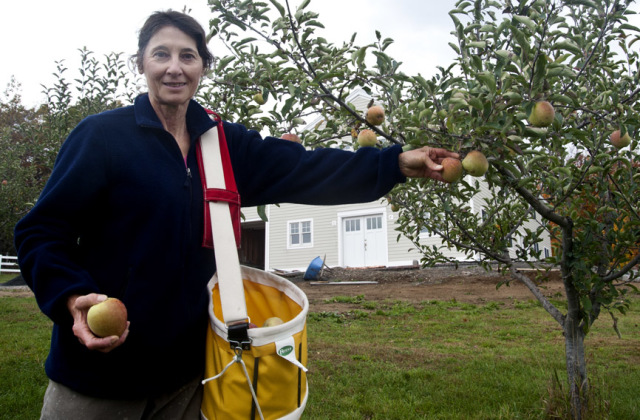Entrepreneurial Farmer Creates Organic Orchard in Norfolk
Pastoral View Preserved
By Rosanna Trestman
In the early 1800s, traffic along Norfolk’s Winchester Road bustled with activity. Farmers prodded cattle while ladies and gentlemen rode carriages to the once-thriving town of Winchester Center. On the way, they enjoyed expansive vistas of meadows and ponds. Over time, the views have become mostly residential, with the exception of Beecher farm at the road’s southern tip, which held on to its rural character until recently, when it was broken into lots and purchased by a developer.
In 2000, rural farming was vanishing, but Joanne Charon, an out-of-towner, was searching for a site suitable for agriculture. Rescuing the Beecher land from development, she purchased approximately 10 acres of land with a small pond which had the potential to support an orchard. Ten years later she was picking her first apples.
Charon’s mission was to provide a healthy legacy for the next generation, and agriculture was a means to that end. “We have to look to the kids’ futures,” she says. “It’s great if kids eat their veggies, but not if they have been treated with pesticides or handled carelessly.”
Charon has had many fascinating careers in her life. She was a navigational radar specialist in the United States Air Force for over a decade and later commissioned as an aircraft maintenance officer in the United States Navy, where she served for 20 years and retired as a commander. Today, she works in the aerospace industry as an aircraft quality assurance specialist.
Her farm exhibits the same precision and sense of detail required of her day jobs, but this endeavor is more physical and labor intensive. “I knew that building an orchard was going to require a lot of work, but I admit that the learning curve has been a little daunting,” she says. Her undertaking is all the more impressive as it is a business, not a retirement hobby, and accomplished on her days off.
The initial stage was to clear the land of rocks and hay and to dig holes to accommodate rows of trees. A driveway was installed and stone walls restored. A post-and-beam storage facility was built in 2012. Despite numerous setbacks during the construction phase and the occasional uncooperative weather, the farm got up and running in just eight years.
Apples are the main crop, and they have taken years to produce. There are over 350 trees neatly arranged by variety, chosen to mature throughout the growing season. Charon has educated herself in every aspect of cultivating apples as well as the numerous other crops on the land. She inspects the apples for pests and diseases, plucking samples from each tree and tracking the fruit’s journey from sapling to sale. Snapping errant branches and pulling out invasive plants, she samples the fruit along the way. “The birds tell me when the fruit is ready, and they destroy the best ones.”
Heavily blemished fruit considered too unattractive for market is discarded for compost. “You have to challenge people’s preconceptions,” she says. “Those who are used to buying organic know that a blemish doesn’t affect the flavor, still, pretty fruit always sell.”
Charon employs Integrated Pest Management, a system whereby farmers familiarize themselves with the life cycles of pests and control them with the least possible hazard to the environment. What she didn’t know from experience, she learned through education. She consults with the Cornell University and University of Connecticut extension services, and takes seminars on plant ecology, pruning and business practices. “Today’s farmer needs to constantly keep up with the F.D.A. requirements on Good Agricultural Practices and food handling and packaging,” she says.
Along with apples, Charon has pear and nectarine trees and several fields where she plants sweet and red potatoes and vegetables such as kale, tomatoes, eggplant and winter squashes, which she sells at the Beacon Falls Farmer’s Market each Friday.
Her produce is all grown organically and she ensures that everything is harvested and handled hygienically from the field to the consumer. She tries to use environmental packaging like cornstarch bags to package vegetables and sugarcane containers for the blueberries.
In addition to farming, Charon decided to add beekeeping to her repertoire as a better way to pollinate the fruit trees. This year the Northwestern Regional 7 agricultural department identified Charon as a registered Connecticut beekeeper and asked if they could put several hives in her apiary, to which she agreed.
Colonies of bees dance atop the flower gardens in full bloom. The kids learn to identify a bee by the pollen on its hind legs and know that the goldenrod in the wetlands will produce a different flavor of honey from the red clover in the fields.
“I’m really proud of these kids from the Northwest Regional High School,” Charon beams. “They are fast learners and enthusiastic, and, like the bees, they are very hard workers.”
Photo caption: Joanne Charon is growing a diverse crop of organic apples at her Norfolk enterprise, Autumn Harvest Orchard.
Credit: Photo by Bruce Frisch

